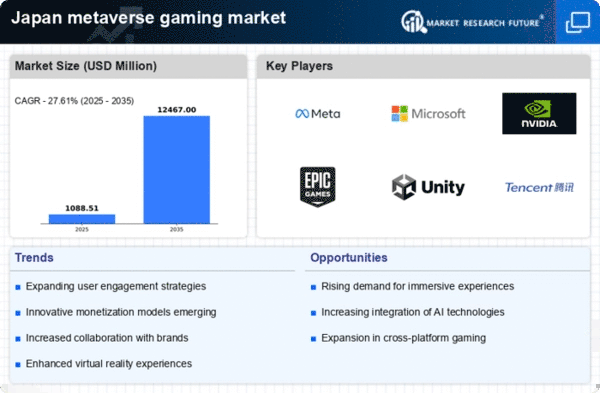Evolving Consumer Preferences
Consumer preferences are evolving rapidly, impacting the metaverse in-gaming market in Japan. Players are increasingly seeking experiences that go beyond traditional gaming, favoring interactive and social elements. As of 2025, surveys indicate that over 60% of gamers in Japan prefer games that offer social interaction and community engagement. This shift in preferences is prompting developers to create games that incorporate social features, such as virtual gatherings and collaborative missions. Additionally, the demand for personalized gaming experiences is on the rise, with players looking for customization options that allow them to tailor their avatars and environments. This evolution in consumer preferences is likely to drive innovation within the metaverse in-gaming market, as developers strive to meet the expectations of a more discerning audience.
Investment in Game Development
Investment in game development is a critical driver for the metaverse in-gaming market in Japan. With the increasing demand for innovative gaming experiences, companies are allocating substantial resources to develop new titles that incorporate metaverse elements. In 2025, it is estimated that the Japanese gaming industry will invest over $2 billion in developing immersive games that utilize VR and AR technologies. This influx of capital not only enhances the quality of games but also encourages collaboration between developers and technology firms, fostering innovation. Additionally, the rise of indie game developers is contributing to a diverse range of offerings in the metaverse in-gaming market, as these smaller studios often experiment with unique concepts and gameplay mechanics. This investment landscape is likely to stimulate further growth and diversification within the market.
Technological Advancements in VR and AR
The metaverse in-gaming market in Japan is experiencing a surge due to rapid advancements in virtual reality (VR) and augmented reality (AR) technologies. These innovations enhance user experiences, making them more immersive and interactive. As of 2025, the market for VR headsets in Japan is projected to reach approximately $1.5 billion, indicating a robust demand for high-quality gaming experiences. The integration of these technologies into gaming platforms allows developers to create more engaging environments, which is crucial for attracting and retaining players. Furthermore, the proliferation of 5G technology facilitates seamless connectivity, enabling real-time interactions in the metaverse. This technological evolution not only enhances gameplay but also encourages investment in the metaverse in-gaming market, as companies seek to leverage these advancements to differentiate their offerings.
Cultural Acceptance of Digital Interactions
In Japan, there is a growing cultural acceptance of digital interactions, which significantly influences the metaverse in-gaming market. The popularity of online gaming and social platforms has fostered a community that embraces virtual experiences. As of 2025, approximately 70% of Japanese gamers engage in online multiplayer games, indicating a strong preference for social gaming experiences. This cultural shift towards digital engagement encourages developers to create more community-oriented features within games, such as virtual events and collaborative gameplay. The acceptance of avatars and digital personas further supports this trend, allowing players to express themselves in unique ways. Consequently, this cultural inclination towards digital interactions is likely to drive growth in the metaverse in-gaming market, as more players seek to connect and interact in virtual spaces.
Regulatory Frameworks Supporting Innovation
The regulatory environment in Japan is evolving to support innovation within the metaverse in-gaming market. Authorities are increasingly recognizing the potential of digital economies and are implementing frameworks that encourage growth while ensuring consumer protection. As of 2025, new regulations are being introduced to address issues such as data privacy and virtual asset ownership, which are crucial for fostering trust among users. These regulatory advancements are likely to create a more stable environment for developers and investors, encouraging them to explore new opportunities within the metaverse. Furthermore, the government's support for technology initiatives is expected to stimulate research and development in the gaming sector, ultimately benefiting the metaverse in-gaming market. This supportive regulatory landscape may enhance Japan's position as a leader in the global gaming industry.
















